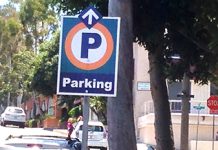By Daniel Langhorne, Special to the Independent
One thing was clear after five hours of discussion at the City Council meeting Tuesday—Laguna Beach residents and business owners remain deeply divided over what their downtown should look like in 10 years.

Preservationists want to keep the unique historic village character they say attracts visitors from around the world. Others who favor a more business-friendly vision say rigid city ordinances are keeping storefronts vacant and landlords from investing in their properties.
One glimmer of hope during the Council’s first review of the Downtown Specific Plan is the agreement of four participating Council members—Council member Peter Blake has rescued himself because he owns an Ocean Avenue commercial building—that the majority of businesses should be allowed to open by right. Multiple speakers from the business community shared stories of how national chains and entrepreneurs have walked away from Laguna Beach after learning about the time-consuming conditional use permit process.
“I would lean toward immediately reducing some of the CUP requirements other than bars and restaurants,” Mayor Bob Whalen said.
Mayor Pro Tem Steve Dicterow and Councilmember Sue Kempf joined Whalen to support dropping the conditional use permits for most commercial uses. Councilmember Toni Iseman said she doesn’t want to lose the conditional use permit as a barrier against problematic businesses. Dicterow said Whalen’s proposal to only require CUPs for bars and restaurants isn’t broad enough. He added there are other commercial uses he and fellow residents don’t want to see downtown and should require a CUP.
The big questions remaining revolve around loosening or eliminating onsite parking requirements for business, rules for developers interested in combining parcels into a single project, and whether to increase building height limits for projects that include affordable housing.
“I think we’re really far apart right now so working on language for an ordinance is way down the line for me,” Dicterow said.
Iseman requested city staffers return next month with more information about the state mandate for Laguna Beach to provide affordable housing under the Regional Housing Needs Assessment (RHNA) program that’s parceled out by the Southern California Association of Governments.
Iseman has suggested the city redevelop the Laguna Beach Bus Depot into a project with public parking on the ground floor and affordable housing on the second story.
City Manager John Pietig recommended that the City Council shouldn’t view the Downtown Specific Plan as the solution to RHNA requirements. The entire city is subject to the state requirement that cities allow zoning that encourages the development of their fair share of affordable housing.
Johanna Felder, president of Village Laguna, said the Downtown Specific Plan was created in 1989 to protect the downtown’s mix of architectural styles, small scale buildings, and pedestrian-friendly atmosphere.
“The draft of the Downtown Specific Plan that you’ll be reviewing is virtually the same as the Planning Commission saw on Oct. 2 and Nov. 20,” she said. “Since we failed to impress upon them the serious issues we raised at those meetings, we hope you’ll listen to us.”
For some residents like Chris Catsimanes, the proposed Downtown Specific Plan would be a giveaway to developers looking to maximize return on investment at the detriment of locals who will have to live with the parking, traffic, noise, and other negative impacts their projects would create.
Small studios developed as affordable housing for college students, seniors, and disabled people might not ultimately be used for that purpose, Catsimanes said.
“Even if you build these 400- or 500-square-foot units, you’re going have people from Los Angeles and Las Vegas rent them and pay whatever they need to,” he said.
Whalen said he’s leaning toward zoning for rental housing rather than for-sale condominiums.
A representative of the real estate company that manages the former Laguna Drug property said the owners are not interested in selling the property to a housing developer because they have “a vested interest in the community.”
Paul Bernard, vice president of the western region for Fritz Duda Co., which manages the property’s holding company Broadway Laguna Partners LP, said prospective tenants have looked at the property but decided not to move forward because of the CUP requirement.
“They said the CUP process is very expensive, it’s very lengthy, and we don’t know if we’re going to get approval because it’s subjective,” Bernard said.
Susan Elliot, owner of Twig of Laguna gift shop, said she lives, works, and dines in downtown Laguna Beach and is deeply concerned about foot traffic now that Hotel Laguna and Tommy Bahama Restaurant are closed.
“Unless we do something it’s not going to cure itself and I feel that many of the proposals will turn the ship,” she said.
Tyler Russell, founder of the KX 93.5 radio station, said he tried to speak on behalf of Laguna Beach residents of his generation who couldn’t attend the meeting because they were at home with their children.
“Unfortunately, this conversation, as many of them have been lately, is dictated by the same faces and to me, they are faces that in 20 years won’t even be here to enjoy this downtown that we’re talking about,” Russell said. “And while that may sound harsh, it’s true, and we are going to be the ones patronizing downtown. Whatever decisions are made today are going to affect me and my kids.”
The City Council will provide additional comments on the Downtown Specific Plan at a January meeting.




